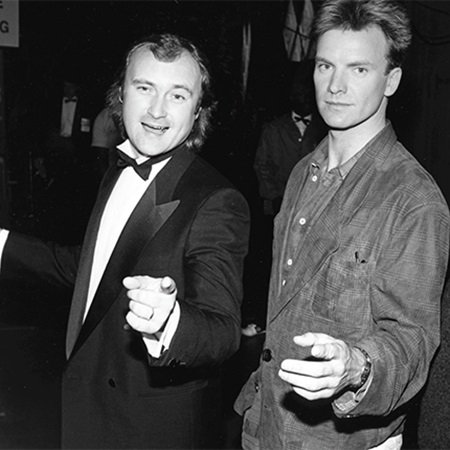Phil Collins and Sting — “In the Air Tonight” Like Never Before It happened on a quiet December night in London — the kind of night when the cold air felt heavy with memory and the city seemed to hold its breath.

The Royal Albert Hall was filled to the brim, not with fans chasing nostalgia, but with people who had come for something more human. It was a benefit concert for UNICEF — a night to raise funds for children displaced by war and famine.
The banners outside simply read: “One Night for Hope.”
No one knew what was about to happen.
Inside, the stage was dark — no spotlight, no introduction, just the faint hum of a crowd whispering, waiting. Then came the sound.
That unmistakable, haunting rhythm.
Boom. Boom-boom. Boom-boom.
The opening of “In the Air Tonight.”

The Entrance
Phil Collins appeared first, seated behind his drum kit, his silhouette barely visible in the half-light. He hadn’t performed the song live in years, and fans knew it. His health had forced him to give up touring; he now sang sitting down, his hands trembling slightly. But that night, something in his eyes burned with purpose.
He began softly, voice gravelly but steady:
“I can feel it coming in the air tonight, oh Lord…”
The audience fell into complete silence — thousands holding their breath as if afraid to break the spell.
And then, halfway through the second verse, another voice joined.
It was deeper, smoother, instantly recognizable.
From the shadows at stage right, Sting stepped into the light, microphone in hand. The crowd gasped, then erupted.
Phil looked over, surprised but smiling. “You again,” he said into the mic, grinning.
Sting laughed. “Thought I’d crash your party, mate.”

Two Voices, One Song
What followed was magic.
They sang together — not competing, not showing off, but listening to each other.
Phil’s gritty, vulnerable tone intertwined with Sting’s sharp, elastic phrasing, creating a harmony no one had ever heard before. It was “In the Air Tonight” — but reborn. The song, once about rage and betrayal, now sounded like a prayer for forgiveness.
When the legendary drum break arrived, the lights exploded in white. Phil’s sticks hit the skins with that iconic thunder, echoing through the hall like the heartbeat of the world. But this time, something else happened.
A children’s choir emerged from the shadows — 40 kids from different countries, all wearing blue UNICEF shirts. They began to hum the melody beneath the drums, soft at first, then louder, stronger.
Their voices rose above the rhythm, fragile and pure, carrying the song somewhere it had never gone before.
Phil stopped drumming and simply watched them — his mouth trembling, his eyes wet.
The Hug That Silenced the Hall
When the final note faded, there was a moment of stillness. Then the children began walking toward the two men, one by one. Some held candles, others carried small drawings of home — homes they no longer had.
Sting knelt down to meet them. One little girl — perhaps seven — handed him a folded paper heart that said “Thank you for singing for us.”
He took it, his voice barely audible: “You’re the reason we’re here.”
Phil reached out and pulled her gently into a hug. Then another child joined, and another, until the two rock legends were surrounded by dozens of children — holding, smiling, crying.
The cameras caught it all: two men who had once been rivals, now silent in the middle of a sea of small, hopeful faces.

The Line That Became a Legend
When the applause finally died down, Sting stepped forward, microphone still in hand. His voice cracked slightly as he said:
“We spent decades trying to out-sing each other…”
He turned to look at Phil, who laughed softly, shaking his head.
“Tonight,” Sting continued, “…we finally sang together.”
The audience erupted again — not in wild cheers, but in something deeper. It was the sound of gratitude, of people remembering what music was meant to do.
The Aftermath
The performance went viral within hours. Millions watched the clip online — Phil Collins, frail but fierce, drumming through pain; Sting, elegant and raw, his voice trembling with emotion; and the children’s choir, glowing like a halo around them.
Comment sections filled with tears and memories.
One fan wrote:
“This isn’t a duet. It’s a prayer disguised as a song.”
Another said:
“Two voices that shaped a generation — now using them for the next one.”
In interviews afterward, Phil called it “one of the most meaningful nights of my life.” Sting said simply, “We didn’t plan it. We just followed the music.”
The Encore That No One Expected
As the lights dimmed and the crowd began to leave, Phil’s voice came through the speakers one last time. “Before you go,” he said, “remember this: the world doesn’t need more perfect notes. It needs more human ones.”
The children’s choir returned quietly, humming the final line of “In the Air Tonight” a cappella as people filed out — their small voices echoing long after the doors closed.
And somewhere backstage, Phil Collins and Sting sat side by side, hands clasped, listening to the sound of the children singing.
No rivalry.
No fame.
Just two men who had given the world its soundtrack — now giving it something even more precious: a moment of grace.
Because sometimes, the most powerful music isn’t the kind that shakes the walls —
It’s the kind that heals the silence.





